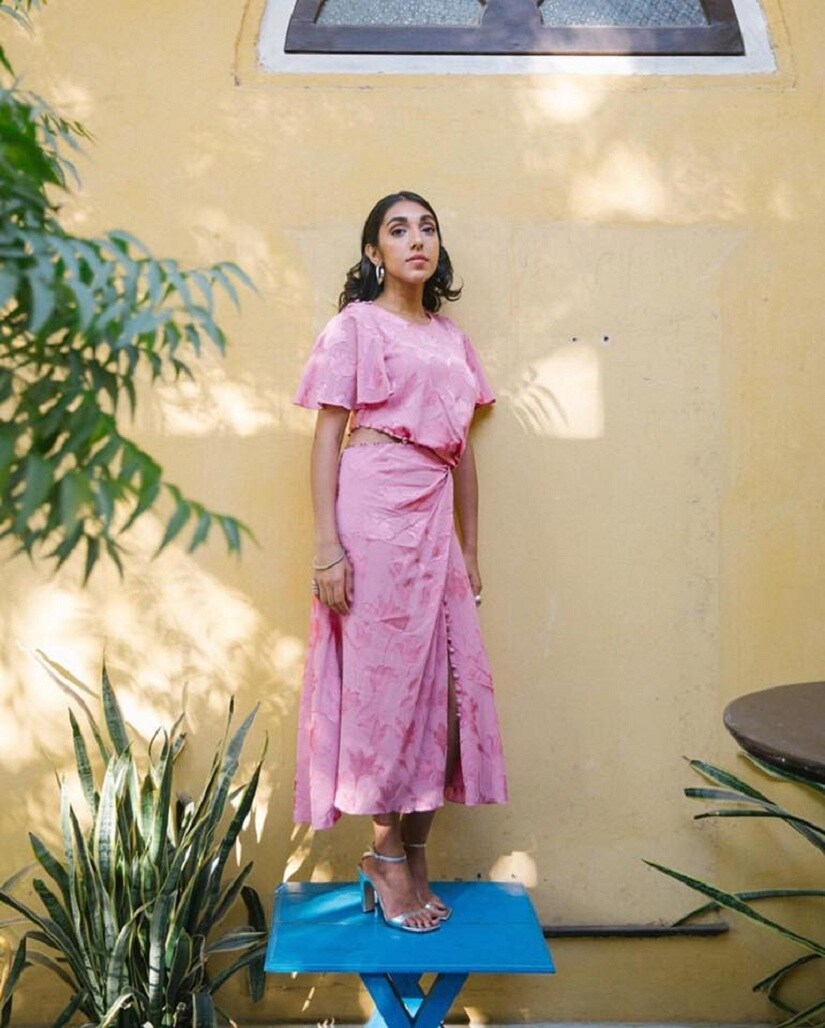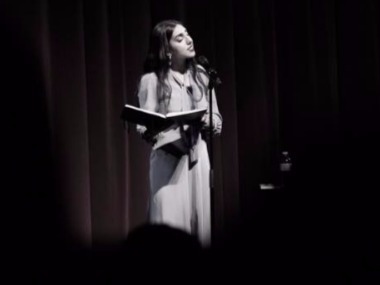It’s day one of the Zee Jaipur Literature Festival in the colourful and sunny city which gives the event its name. In front of me walks a group of girls; they can barely contain their excitement. They’re an interesting bunch to see at a literary festival — anywhere between 14-18 years old, probably at an age where they’re just learning about the workings of the heart in school. They weren’t part of the school group tours that one sees at the JLF. I follow them into the tent they were headed to, giggling with anticipation, to discover they’re waiting to hear the global sensation (and as the person seated next to me points out, a New York Times bestselling writer) Rupi Kaur. The energy in the tent is quite something, and I notice most of the crowd here comprises young women. I tell someone I am not entirely familiar with Rupi’s poems, being exposed to them only through fleeting encounters on Instagram — a medium I didn’t quite associate with poetry before. The young woman next me hears this and looks disappointed; she asksif I do anything remotely connected to literature. I tell her I teach literature at a university and she looks at me askance: “You teach literature and you haven’t read Rupi Kaur, the poet?” Instantly, I feel guilty about not being up to speed with this fast-changing modern world of poetry, where it comes to us through all kinds of new mediums, like Instagram/Facebook or Twitter. The session has the audience enthralled, and I decide I must read more of Rupi’s work and promptly rush to the bookstore. On the way, I meet the beautiful young mother who has come all the way to JLF because her 14-year-old daughter, studying at the American Embassy School, is a fan of Rupi Kaur. The young poet clearly has a massive audience and I wonder what she’d be like to converse with. The very next day, I get a chance to interview Rupi, at the press terrace of the Diggi Palace (where JLF is held every year). There is rush of people waiting to meet and her and we go inside one of the dim rooms, making for a change from the otherwise bright day. Rupi is young, cheerful and warm; she understands what she represents, and the need for people like her to express themselves. This is how the chat goes. * Rupi, you have captured the attention of audiences, made poetry accessible and got young people interested in poetry. Tell us how it all started. I have no idea how I got into it. But I’ll tell you that there was a moment in high school when I was tired of feeling that I did not have a voice… I grew up as a deeply empathetic child. I could see somebody else’s sadness and suddenly I would be in tears. One day I saw a poster of an open mic (event) that has happening within my community. I decided to go. At that moment, I had no idea what I was going to do. The only performing I had done till then was with a classic Indian musical instrument, the form of a kirtan. So I called my friend and we thought maybe we would go write a poem and just say it out loud. And that’s what we did. We wrote this poem. It was terrible by the way — at that moment I did not realise it! [caption id=“attachment_4322853” align=“alignnone” width=“825”]  Rupi Kaur at the Zee Jaipur Literature Festival 2018. Image courtesy Facebook/@rupikaurpoetry[/caption] Anyway we went and performed — and it was so exhilarating. For the first time, I felt that I had a voice. It was a room as small as this [indicating where the interview was being conducted]. And most of the audience was guys who were 10 years older than me, and I was so nervous because I was such a shy child. But that feeling of those eyes looking at you was so exhilarating and from then on I was hooked on to the stage. This was before you used the online space to create your identity as a poet? How did that come about? I continued to perform and perform for many years. The reason I started to translate my work into an online space was because after a few years of performing, I was mostly doing pieces about female infanticide, farmer’s suicide — issues that were really affecting my family back here in India. My friends of course would say to me that more and more people need to hear this, because I was mainly performing in a small community in Malton, Canada, but the things I was performing affected diaspora everywhere. So my friends showed up at my house with a video camera and one of them was making me a Facebook page, a Tumblr page and another was recording a video of my spoken word… That’s when I got comfortable with sharing my work online and eventually I travelled to Instagram. And it was very responsive, it was instant, people interact with your words immediately. And this was before your first book, Milk and Honey… That’s how I ended up getting published too. I had no plans of publishing a book at that time. But as my audience kept building, I would receive emails asking me where they could purchase my book. And I would say, ‘What are you talking about, I don’t have a book!’ But I thought maybe it is important to take the opportunity when it comes, and wondered if it was time to write a book. Except that was really hard… Even my Creative Writing professor told me that poetry does not get published, there is no market for it. And even though she didn’t say it, I also realised that she meant that it was hard for my kind of poetry to get published. That was true… I started looking at literary magazines and anthologies being published and not one of them carried my kind of work. So when I was getting all the rejection letters, it made sense.
Mine was a different world. That’s when I knew I had to publish my own work. I wanted to represent my poetry fully and really well. I decided to design every single aspect of my book and put it out in the world, and here we are.
You come from a specific context. Does that essentially define your work and your will to be a poet? I was 16 or 17 when I first performed. The place where I lived was called Malton and it was mainly south Asian immigrants and that’s why what I write is so focused on the immigrant experience. Mostly everyone was immigrants and children of immigrants, like me. Did you imagine at that moment the way your poetry and performance would enthrall young audiences? Never. I never imagined it. But I was always determined. I never stopped. Even after Milk and Honey was published I was trying to be a lawyer. I was in University finishing up tot degree. People would say, ‘Oh you are an author!’ And I would say, ‘No I am not. That’s just my hobby.’ I was trying to be something else. Though I loved writing so much and I guess when you love something so much eventually it snowballs into something. Do you also think the feeling that you had — of being voiceless — was something people could relate to on an everyday basis? Yes, absolutely. The western world does not understand us. We South Asian immigrant children had that feeling in common. At the same time, your Indian household has no idea what you are going through. My parents would say, ‘How is your life difficult? We had to walk to school. We got one pair of shoes every five years. We came to Canada with 10 dollars.’ [caption id=“attachment_4322863” align=“alignnone” width=“825”]  From Rupi Kaur’s ‘Milk and Honey’. Images courtesy Facebook/@rupikaurpoetry[/caption] And you are feel, ‘How will I ever get any sympathy from you?’ You realise nobody gets you and your struggle with identity. The literature you study, the things you watch on TV — none of it reflects you. You are hungry to understand things, you experience self-hate. Then you find a group of brown people, who are like you… That’s what happened to me. I found a group of people, and they were first ones to tell me to love myself. That we are so beautiful, our brown Asian skin, our bodies. And that was very important to me, because before that, I hated being brown. It was never easy being a girl — that too a brown girl. I’d feel that life would be so much easier if I was a white person. That group of people changed my life. They supported me, they put me on stage. You also write and draw? Is a particular medium/art that is closer to you? Well I have been drawing since I was very little. I was five or something. And even with writing I used to write poems on friend’s birthdays as gifts, because I didn’t have enough money (to buy them anything). But my medium is not drawing or writing — my parents did not even know I was publishing a book till it arrived home! My art is expression. Sometimes I use writing, sometimes photography to express. What happened after you published the book? When did you get a sense of its popularity? Since my book is self-published, I didn’t really know how to gauge success in the literary world. Only later did I get an email from a publisher who wanted to publish my book again. We worked out a deal and they gave me full creative control, they even let me choose the design. I was travelling at that time of its publication and because of the distribution, it sold (well). After a while, I was supposed to perform in San Francisco, and I wondered who would come for the performance. We pull up near the venue and realise there is a queue to the end of the road! It was block after block. The security took me up front and people were clapping and I was just taken by surprise. The interesting thing was that with my book, most of the sales were from bookstores and not online. It was almost as if people would pick up the book and there was an emotional connection. That’s it. Something just worked. * At this point, we have exhausted our time. On my way out, the publisher informs me that Rupi is supposed to perform in Delhi soon. I promise to look out for her. Then, shoulders squared, I make my way to the next session, one on translation, trying not to be jostled by the massive crowds that have gathered to see Nawazuddin Sidduqi on stage for a panel discussion on Manto.


)
)
)
)
)
)
)
)
)



